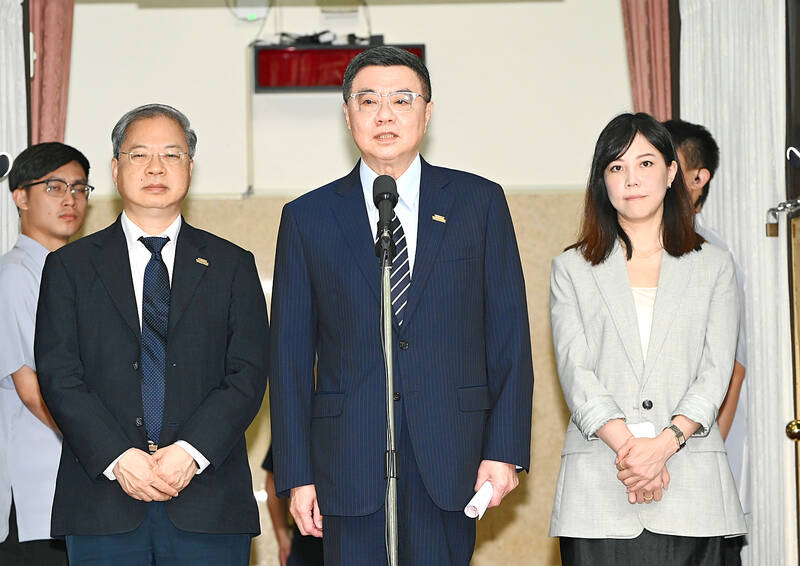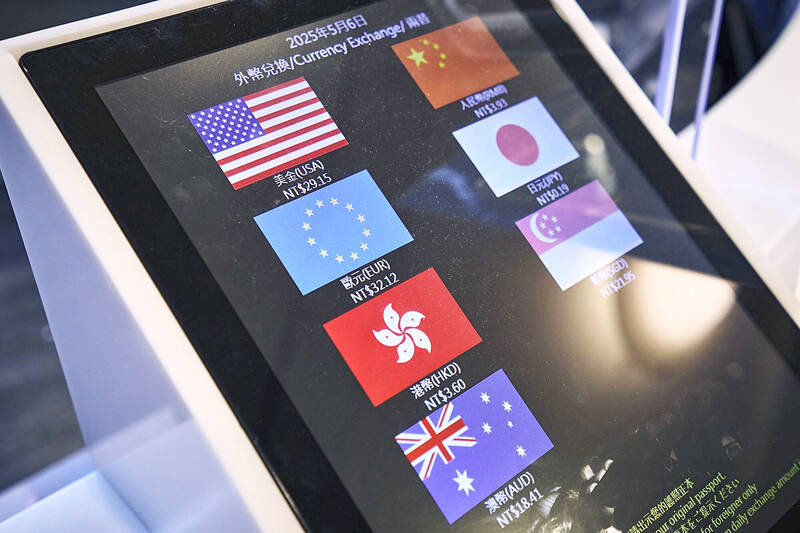The government is not engaged in currency manipulation, Premier Cho Jung-tai (卓榮泰) reiterated yesterday, amid speculation that the sudden appreciation of the local currency was related to pressure from the US.
Speaking prior to a plenary session at the Legislative Yuan, Cho said the New Taiwan dollar has always been stable, that Taiwan was not a country that engaged in currency manipulation and that the central bank has always abided by the law in observing fluctuations in exchange rates.
Asked about central bank Governor Yang Chin-long’s (楊金龍) comment that there were signs of speculators seeking to disrupt the NT dollar, Cho said that such illegal market behavior would not be tolerated.

Photo: Tien Yu-hua, Taipei Times
He added that he had asked the central bank and financial institutions to impose strict checks on such behavior.
The NT dollar rose sharply on Friday and Monday, appreciating by NT$1.872 from NT$32.017 against the US dollar on Wednesday to close at NT$30.145 on Monday.
The local currency had hovered at about NT$32.5 to NT$33 from the beginning of this year to late last month before its sudden surge.

Photo: An Rong Xu, Bloomberg
The sharp gains, combined with the US dollar lagging behind most major currencies over the past two sessions, led to speculation that Asian countries, including Taiwan, were trading higher exchange rates for lower levies in response to US President Donald Trump’s tariff threats.
Taiwanese officials have been at pains to repeat that the NT dollar’s sudden appreciation had nothing to do with pressure from Washington, but the government has done little either rhetorically or in practice to call out Trump’s coercion on tariffs and trade.
Cho said he hoped that market mechanisms would stabilize exchange rates, and that seemed to be the trend yesterday.
The US dollar was trading at about NT$30.13 at noon yesterday after falling below the NT$30 threshold earlier in the morning. It closed at NT$30.280.
Taiwan had been listed by the US as a currency manipulator in 1988 and 1992, and it was included on the US Department of the Treasury’s currency “monitoring list” in its latest report in November last year, the sixth time in a row Taiwan has made the list.
The designation identifies major US trading partners “whose currency practices and macroeconomic policies merit close attention.”

MAKING WAVES: China’s maritime militia could become a nontraditional threat in war, clogging up shipping lanes to prevent US or Japanese intervention, a report said About 1,900 Chinese ships flying flags of convenience and fishing vessels that participated in China’s military exercises around Taiwan last month and in January have been listed for monitoring, Coast Guard Administration (CGA) Deputy Director-General Hsieh Ching-chin (謝慶欽) said yesterday. Following amendments to the Commercial Port Act (商港法) and the Law of Ships (船舶法) last month, the CGA can designate possible berthing areas or deny ports of call for vessels suspected of loitering around areas where undersea cables can be accessed, Oceans Affairs Council Minister Kuan Bi-ling (管碧玲) said. The list of suspected ships, originally 300, had risen to about 1,900 as

Japan’s strategic alliance with the US would collapse if Tokyo were to turn away from a conflict in Taiwan, Japanese Prime Minister Sanae Takaichi said yesterday, but distanced herself from previous comments that suggested a possible military response in such an event. Takaichi expressed her latest views on a nationally broadcast TV program late on Monday, where an opposition party leader criticized her for igniting tensions with China with the earlier remarks. Ties between Japan and China have sunk to the worst level in years after Takaichi said in November that a hypothetical Chinese attack on Taiwan could bring about a Japanese

MORE RESPONSIBILITY: Draftees would be expected to fight alongside professional soldiers, likely requiring the transformation of some training brigades into combat units The armed forces are to start incorporating new conscripts into combined arms brigades this year to enhance combat readiness, the Executive Yuan’s latest policy report said. The new policy would affect Taiwanese men entering the military for their compulsory service, which was extended to one year under reforms by then-president Tsai Ing-wen (蔡英文) in 2022. The conscripts would be trained to operate machine guns, uncrewed aerial vehicles, anti-tank guided missile launchers and Stinger air defense systems, the report said, adding that the basic training would be lengthened to eight weeks. After basic training, conscripts would be sorted into infantry battalions that would take

DEEP-STRIKE CAPABILITY: The scenario simulated a PLA drill that turned into an assault on Taiwan’s critical infrastructure, with the launchers providing fire support Taiwan yesterday conducted this year’s first military exercises at Longsiang Base in Taichung, demonstrating the newly acquired High Mobility Artillery Rocket System’s (HIMARS) ability to provide fire support and deep-strike capabilities. The scenario simulated an attack on Penghu County, with HIMARS trucks immediately rolling into designated launch areas and firing barrages at the Wangan (望安) and Cimei (七美) islands, simulating the provision of fire support against invading forces. The HIMARS are supposed to “fire and leave,” which would significantly increase personnel and equipment survivability, a military official said. The drill simulated an exercise launched by the Chinese People’s Liberation Army (PLA) Eastern